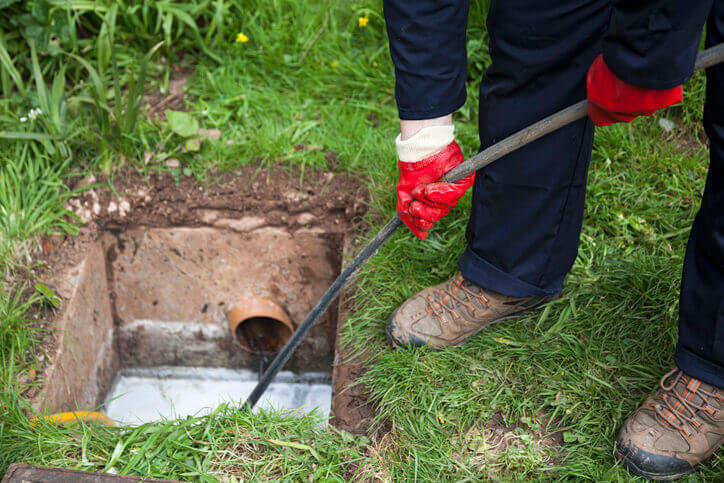Whether you are planning to sell your property or looking to buy a new home, having your septic system inspected before closing the deal may be necessary.
In numerous jurisdictions across the US, it is a requirement for a seller to have the septic system inspected by a qualified septic inspector upon the transfer of a property.
But what options do the buyer or seller have if the worst happens and the septic inspection fails?
Seller’s Options

Suppose you’ve found a buyer for your property, but unfortunately, you receive a failure report from the septic system inspector.
What options do you have as a seller? How can you address the issue and prevent losing the sale?
Here are some steps you can take to manage a failed septic inspection:
1. Negotiate With the Buyer
Depending on the extent and cost of the repairs needed, you can negotiate with the buyer to reach a mutually acceptable agreement. Here are some possible scenarios:
- You agree to fix the problem before closing: You can hire a licensed septic contractor to perform the necessary repairs or replacements and provide proof of completion to the buyer. You may also need to obtain a re-inspection or a certificate of compliance from the local authority.
- Lower the price or offer a credit to the buyer to cover the repair costs: You can adjust the sale price or offer a credit at closing to compensate for the repair expenses that the buyer will incur after purchasing the property.
- You split the repair costs with the buyer: You can share the responsibility and expense of fixing the problem with the buyer in an agreed proportion.
2. Sell the Property As-Is
You can disclose the septic system failure to potential buyers and sell the property without making any repairs.
I understand you may be wondering whether selling a home with a failed septic system is feasible.
Well, the answer is: it depends on your jurisdiction. In certain areas, local regulations might prohibit the sale of a property with a failed septic system, while in others, it may not pose a significant obstacle.
If the prospective buyer is seeking financing to purchase the property, it’s highly likely that the mortgage company will not approve a loan for a property with a failed septic system. Most lenders typically require repairs to be completed, ensuring the septic system functions optimally before finalizing the property transaction.
So, if you choose to sell the property as-is, anticipate attracting a limited number of prospective buyers, selling the property at a reduced price, and experiencing an extended timeline to close the deal.
3. Consider Appealing or Challenging the Inspection Results
If you disagree with the findings or recommendations of the inspector, you may appeal or challenge them through an administrative process or legal action.
You may need to provide evidence or documentation to support your claim, such as:
- A second opinion from another qualified inspector or contractor
- A soil test or a hydraulic load test to verify the condition or capacity of the drain field
- A repair estimate or invoice from a reputable septic company
- A copy of your maintenance records or permits
However, appealing or challenging an inspection result may not be easy or cheap, and it may not guarantee a favorable outcome. You should consult with your real estate agent, lawyer, or local authority before pursuing this option.
4. Find Out Why Your Septic System Failed
The inspector should provide you with a written report that explains the reasons for the failure, the severity of the problem, and the recommended solutions. Some common causes of septic system failures are:
- Lack of regular pumping and maintenance: The septic tank should be pumped every three to five years to remove the accumulated solids and prevent them from clogging the drain field. The tank should also be inspected at least every three years for any signs of damage or malfunction.
- Overloading the system with excess water or waste: Using too much water or disposing of inappropriate materials (such as grease, oil, chemicals, paper towels, sanitary products, etc.) can overwhelm the system’s capacity and cause backups, overflows, or contamination.
- Damage to the tank or drain field by external factors: Tree roots, vehicles, construction activities, flooding, erosion, or soil compaction can damage the pipes, tank, or drain field and affect their function.
- Aging or design flaws: Older systems may not meet current standards or codes and may have inadequate size, capacity, or materials. Some systems may also have design defects that prevent the proper treatment or disposal of wastewater.
You may also want to check: Grandfathered Septic Systems: Everything You Need To Know
Buyer’s Options

As a home buyer, the last thing you would expect is to buy a house with a bad septic system because that means you will have issues with your entire drainage system.
However, the good news is that a bad septic system should not be a deal breaker, especially if you already loved the house.
Here are steps to take when a septic system of a property you are about to purchase fails inspection.
1. Negotiate with the Seller
Initiate discussions with the seller regarding the failed septic inspection. Consider negotiating for repairs, replacements, or a reduction in the property price to accommodate the costs of fixing the septic system. Collaborate to find a mutually agreeable solution.
Before you negotiate with the seller, comprehend the specifics of the failed septic inspection. Request a detailed report from the inspector outlining the issues detected. This insight will help you gauge the severity of the problem and plan accordingly.
Then assess the available repair options based on the inspection report. Determine whether the issues can be resolved through repairs or if a complete replacement is necessary. Evaluate the associated costs, time frame, and impact on the property.
IMPORTANT: Seek advice from a professional septic system inspector or contractor. Their expertise can provide a deeper understanding of the problems identified, potential solutions, and estimated repair costs. They’ll guide you through the necessary actions required to rectify the issues.
2. Request for Escrow Holdback
In certain instances, the seller might agree to septic system repairs but may not have the immediate financial means to execute them. If such a situation arises, negotiating with the seller to allocate funds into an escrow account specifically designated for septic system repairs is advisable. This strategy guarantees that the essential repairs will be carried out after the property’s closing, offering a resolution agreeable to both parties involved.
If you’re obtaining financing from a loan company for the property purchase, most loan companies in the United States typically require a holdback of approximately 1.5 times the repair or replacement cost. For instance, if the repairs are estimated at $2000, the loan company will insist that the seller allocates $3000 from their sale proceeds to be held in escrow. These funds are refundable to the seller once the septic system undergoes repairs, subsequent re-inspection, and receives approval from the relevant authorities.
Learn more here:
3. Include Contingencies in the Contract
If negotiations with the seller involve repairs or replacements, ensure these terms are clearly outlined in the purchase agreement. Include contingencies that protect your interests should the repairs not meet the agreed-upon standards.
4. Review Your Financing Conditions
If you’re relying on financing to purchase the property, review the terms and conditions with your lender. Understand how a failed septic system inspection affects your loan approval and if the lender requires specific repairs before proceeding with the mortgage.
5. Worst-case scenario: Walk away
As a buyer, you possess the prerogative to consider walking away if the sellers refuse to address the septic system issues. Investing in a property necessitates assurance in its structural integrity, and a compromised septic system can pose substantial future expenses and inconveniences. It’s reasonable to prioritize a sound investment and not commit to a property with evident problems that might entail immediate, costly solutions. Walking away may safeguard your financial interests and ensure you find a property that meets your standards without unforeseen burdens.
Other Important Aspects to Know

I. What does Septic System Inspection Entail?
A septic system inspection entails an assessment of the system’s condition and operation, which can reveal any problems or potential failures that may affect its performance or pose a health or environmental risk.
The inspection process and criteria may vary depending on the jurisdiction and the type of system, but generally, it involves checking the tank for leaks, cracks, corrosion, sludge and scum levels, baffles, filters, pumps, alarms, and other components.
It also involves measuring the water level and flow in the tank and the drain field, testing the soil and groundwater quality around the drain field, and reviewing the maintenance records and permits of the system.
II. Who Should Pay For Septic Inspection: The Buyer Or The Seller?
It depends on your local regulations. In certain states, such as Texas and South Carolina, buyers are obligated to bear the expense as part of their due diligence when acquiring a property. Conversely, in states like Virginia, it is the seller’s obligation to fund the septic inspection. In these areas, sellers must ensure that their property’s septic system undergoes inspection within 30 days of the closing date.
To clarify any uncertainties regarding local regulations, it is advisable to consult your local real estate firm.
Also check out this post for more in-depth insights: Who Pays For Septic Inspection: Buyer Or Seller?
III. How much does septic inspection cost?
Typically, septic inspections cost between $350 to over $1500, varying based on the tank’s size, the inspection’s extent, and the rates charged by the inspection officer. If the property has private water sources, a well inspection might also be necessary, further increasing the overall cost.
Also Check: How Much Does It Cost To Tie Into Existing Septic Tank?
